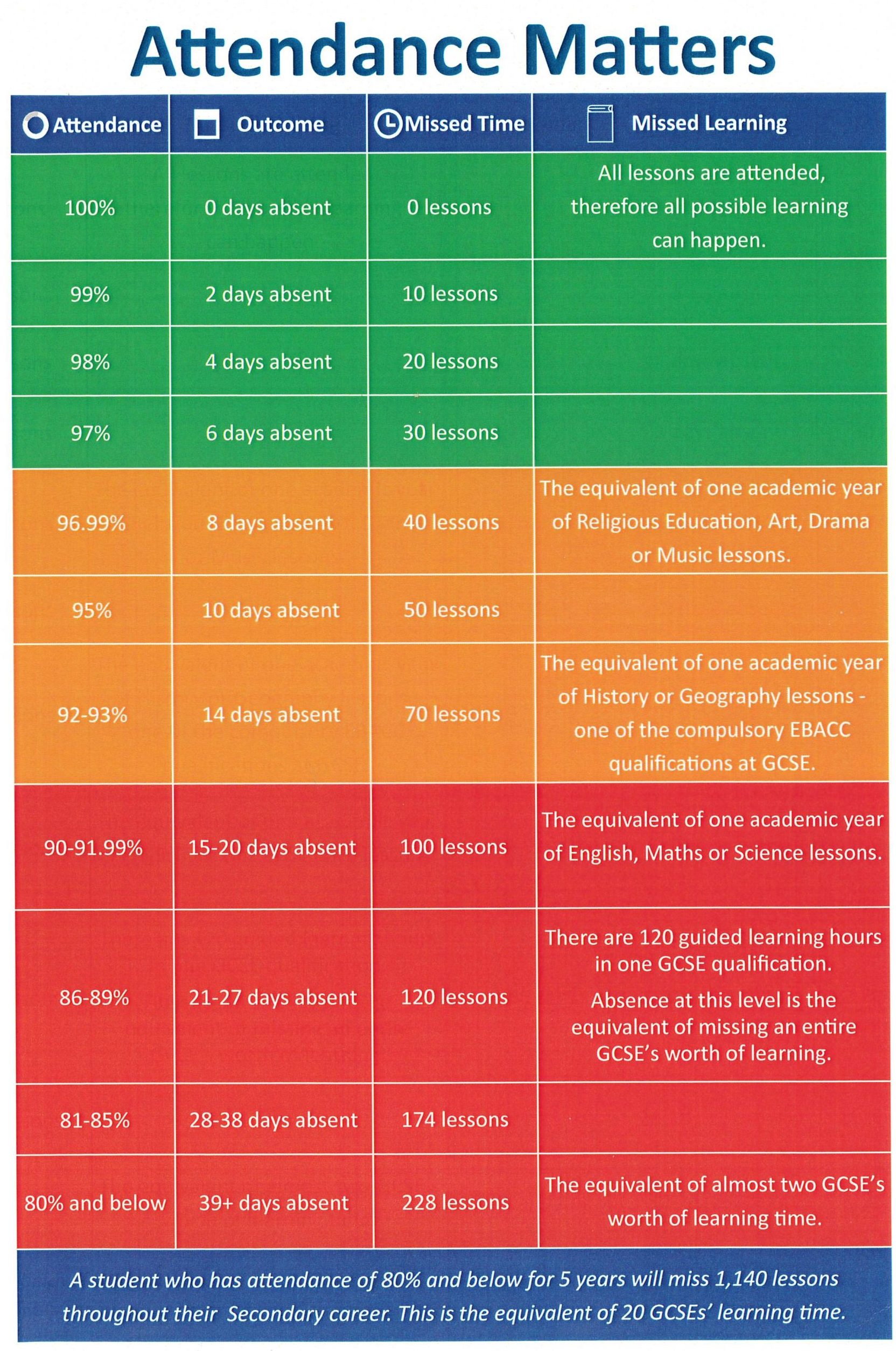Attendance
In order to ensure that all students have good school attendance it is important that all parents/carers support the school in aiming for 100% attendance each year for their child.
Did you know that of pupils who miss between 10% and 20% of school:
-
only 35% manage to go on and achieve five A* to C GCSEs including English and Mathematics, compared to 73% of pupils with over 95% attendance
-
only 66% of pupils gained a Level 4+ in English or Mathematics at Key Stage 2, compared to 87% of pupils with over 95% attendance.
Approaches to attendance at BGLC
The table below outlines our expectations at school regarding levels of attendance and the impact of lower attendance on GCSE outcomes using national data.

Dealing with Absence
Types of Absence
Each absence is classed as authorised or unauthorised. Absences are coded as authorised where reasons are considered valid and unauthorised where no explanation or unacceptable reasons are given.
Unacceptable Reasons
The following reasons are not acceptable:
- shopping visits
- care for family members
- days out to theme parks or to attend concerts/shows
- parents’ work commitments or business trips
- holidays taken in term time (including long weekends taken on Fridays and/or Mondays)
- parental illness
Unauthorised absences will be referred to the Local Authority.
Illness and First Day Call
If your child is unable to attend school through illness you should inform us by email attendance@brookvalegroby.com on the first day of absence before 9.00am. Alternatively you can call 0116 287 9921 and press option 1 for absence, or call in, in person at the BGLC Reception. It is useful to know the expected day of return. If you do not supply us with this information we have a duty to contact you so that we may be sure of the child’s whereabouts, as this is a safeguarding measure.
Where a child is absent through illness or medical appointment, this will normally be counted as authorised. Where we have concerns over excessive absence patterns through illness we will need to discuss this with parents in order to gain a better understanding of the problems and to offer support – for example by involving the School Health Service.
Medical/Dental Appointments
It is generally better if these can be arranged outside school hours, but we know this is not always possible. Where children need to attend such appointments during the school day it is important that parents come first to the Reception before collecting children. Please bring your child to Reception on returning from the appointment. Please indicate in advance whether s/he will be returning for the midday meal. Medical and dental appointments count as authorised absences.
Emergency Occasions
There are some occasions e.g. bereavements, family problems etc. where it may be inappropriate for children to attend school; we will be sympathetic to such needs.
Lateness
Please try to ensure that your child arrives at school so that they are present for registration; this is done at 8.40am each day. Where a genuine reason for lateness exists, this will be an authorised absence, but where explanations are inadequate or the lateness is after 9.00am then an absence (late) will be recorded.
LEAVE OF ABSENCE:
Holidays
It is not our policy to authorise holidays in term time. The only exemption to this is where parents serve in the armed forces (this does not extend to the emergency services i.e. Police, Fire, Ambulance etc). Where authorisation is not granted then subsequent term time holiday absence will be reported as a matter of course to the Education Welfare Service; we are under a duty to do this. Where unauthorised leave is taken, the Trust Board has decided that it will support the imposition of a fixed penalty fine. This can be very expensive. This will apply to any parents who book holidays in term time.
Approved Public Performance
Where children are invited to perform in a licensed show or concert (e.g. orchestra, pantomime) you are asked to consult with staff about how much time away from school is required. Where possible such requests will be granted provided that the child’s education is unlikely to suffer. The school will also be sympathetic towards leave to participate in a recognised city, county or national sporting event.
What we are aiming for
Average attendance would be around 97% for the year, with outstanding attendance above 98%.
What is considered as poor attendance
Anything below 94% is weak, under 90% is poor and if attendance dips below 85% we will have serious concerns. Below 90% is regarded as persistent absence by the DFE. In this school we are aiming for every pupil to achieve attendance levels of at least 97%. We monitor attendance and provide termly reports on each pupil’s attendance. At the end of each half term we identify all those pupils whose attendance has fallen below 90% and issue a courtesy letter or make telephone calls informing parents. We then monitor the pupils’ attendance on a weekly basis and hope to see a pattern of unbroken weeks developing.
Our duty of care in responding to unauthorised and persistent absence – possible consequences
We have a duty of care, shared with the Local Authority, to challenge poor attendance. Where attendance levels are low and where there are invalid reasons (judged by the Education Welfare Service, not the parent) for a pupil’s frequent absence or where parents condone absence (e.g. by taking children out of school on unauthorised holidays) then parents render themselves liable to a fine of £60 per pupil per parent. This could mean a fine of £360 for two parents of three children. This would be doubled to £720 if the fine is unpaid within 21 days and could ultimately lead to a criminal conviction. Of course, no one wants this to happen but we need to be very clear about the issue.
Links to:

